RESEARCH FOCUS
We are dedicated to various fascinating areas of pharmacological research, ranging from substance testing, to deciphering complex molecular / immunological reactions in heart disease, to the production of thearpeutic antibodies in tobacco plants.
Here are some of the focal points of our work:
Phenotyping of diseases associated with cardiovascular dysfunction, metabolic disorders and cancer Our research groups are dedicated to phenotyping diseases associated with cardiovascular dysfunction, metabolic disorders and cancer. By comprehensively characterizing these diseases, we aim to develop personalized and targeted therapeutic approaches.
Natriuretic peptides and immune mechanisms of stress-induced vulnerability and resilience The work of the KÄMMERER GROUP sheds light on the fascinating links between natriuretic peptides and the immune mechanisms that influence stress-induced vulnerability and resilience. This innovative field of research promises new insights into the links between stress, immune response and disease development.
The role of sheddases in the immunological response after myocardial infarction The research of the KLAPPROTH GROUP focuses on the role of sheddases in the immunological response after myocardial infarction. By deciphering these mechanisms, we aim to gain a better understanding of post-infarction immunological processes in order to develop targeted therapeutic approaches.
Biopharming Our research in the field of biopharming focuses on innovative approaches to the production of pharmaceutical proteins such as antibodies in tobacco plants based on the principle of the circular economy. This not only enables sustainable and cost-effective production, but also opens up new perspectives for the development of therapeutics.
Validation and safety testing of pharmaceutical substances Our expertise in safety pharmacology and toxicology is crucial for the development of safe and effective therapies. We use state-of-the-art methods to validate the safety of pharmaceutical substances and identify adverse effects at an early stage.

